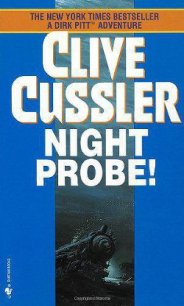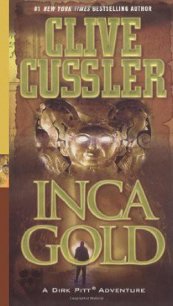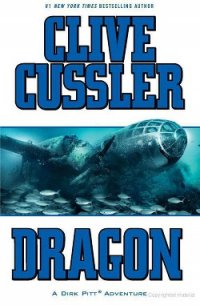Raise the Titanic - Cussler Clive (электронная книга .TXT) 📗
Pitt took it and marveled at the firm grip. "This is indeed an honor, Commodore. I have often read of your heroic escape from the Titanic. "
"So much rot," he grumbled. "I was torpedoed and cast adrift in both World Wars, and all anybody ever asks me about is the night of the Titanic. " He motioned to a chair. "Don't stand there like a beardless lad on his first trip to sea. Sit down. Sit down."
Pitt did as he was told.
"Now tell me about the ship. What does she look like after all these years? I was a young man when I served on her, but I still remember her every deck."
Pitt reached into the breast pocket of his coat and handed Bigalow an envelope of photographs. "Perhaps these can give you some idea of her present condition. They were taken by one of our submersibles just a few weeks ago."
Commodore Bigalow slipped on a pair of reading glasses and studied the pictures. Several minutes ticked off a ship's clock beside the bed while the old mariner became lost in the memories of another time. Then he looked up wistfully. "She was in a class all by herself, she was. I know. I sailed them all the Olympic . . . Aquitania . . . Queen Mary. Sure they were elaborate and modern for their time, but they couldn't touch the care and craftsmanship that went into the Titanic's furnishings her wonderful paneling and her marvelous staterooms. Aye, she still casts a heavy spell, she does."
"She grows ever more bewitching with the years," Pitt agreed.
"Here, here," Bigalow said as he pointed excitedly to a photo, "by the port ventilator on the roof over the officers' quarters. This is where I was standing when she sank beneath my feet and I was washed into the sea." The long decades seemed to melt away from his face. "Oh, but the sea was cold that night. Four degrees below freezing it was."
For the next ten minutes he talked of swimming in the icy water, miraculously finding a rope that led to an overturned lifeboat; the awful mass of struggling people; the pitiful cries that pierced the night air and then slowly died out; the long hours spent clutching the keel of the boat, huddled against the cold with thirty other men; the excitement when the Cunard liner Carpathia hove into view and made the rescue. Finally, he sighed and peered over the tops of his glasses at Pitt. "Am I boring you, Mr. Pitt?"
"Not in the least," Pitt answered. "Listening to someone who actually lived the event seems almost like living it myself."
"Then I'm going to give you another story to try on for size," Bigalow said. "Until now I never told a soul about my last minutes before the ship went down. I never mentioned a word in any of my interrogations about the sinking; not to the United States Senate inquiry or to the British Court of Inquiry. Nor; did I ever breathe a syllable to the newspaper reporters or writers who were forever researching books on the tragedy. You, sir, are the first and will be the last to hear it from my lips."
Three hours later, Pitt was on the train back to Exeter, neither tired nor worn. He did feel a kind of excitement. The Titanic, along with the strange enigma locked within the vault of cargo hold No. 1, G Deck, beckoned to him now more than ever. Southby, he wondered? How did Southby fit in the picture? For perhaps the fiftieth time he looked down at the package that Commodore Bigalow had given him. And he was not sorry that he had come to Teignmouth.
45
Dr. Ryan Prescott; chief of the NUMA Hurricane Center in Tampa, Florida, had had every intention of getting home on time for once and spending a quiet evening with his wife playing cribbage. But at ten minutes before midnight he was still at his desk staring tiredly at the satellite photos spread before him.
"Just when we think we've learned all there is to know about storms," he said querulously, "one pops out of nowhere and breaks the mold."
"A hurricane in the middle of May," his female assistant replied between yawns. "It's one for the record book all right."
"But why? The hurricane season normally extends from July to September. What caused this one to materialize two months early?"
"Beats me," the woman answered. "Where do you figure our pariah is headed?"
"Too early to predict with any certainty," Prescott said. "Her birth followed the normal patterns, true enough vast low-pressure area fed by moist air, swirling counterclockwise due to the earth's rotation. But here the difference ends. It usually takes days, sometimes weeks, for a storm four-hundred miles wide to build up. This baby pulled off the trick in less than eighteen hours."
Prescott sighed, rose from his desk, and walked to a large wall chart. He consulted a pad covered with scribbles, noting the known position, atmospheric conditions and speed. Then he began drawing a predicted track westerly from a point a hundred and fifty miles northeast of Bermuda, a track that gradually curved northward toward Newfoundland.
"Until she gives us a hint of her future course, that's the best I can do." He paused as if waiting for confirmation. When none came, he asked, "Is that how you see it?"
Still receiving no reply, he turned to repeat the question but the words never came. His assistant had fallen asleep, her head cradled in her arms upon the desk. Gently he shook her shoulder until the green eyes fluttered open.
"There's nothing more we can do here," he said softly. "Let's go home and get some sleep." He glanced warily back at the wall chart. "Chances are it's a thousand-to-one fluke that will dissipate before morning and lapse into a minor localized storm." He spoke with some authority, but there was no conviction in his tone.
What he did not notice was that the line on the chart representing his predicted course for the hurricane traveled precisely over 41°46` North by 50°14' West.
46
Commander Rudi Gunn stood on the bridge of the Capricorn and watched a tiny blue speck far to the west materialize out of the diamond-clear sky. For a few minutes it seemed to hang there, neither changing shape nor growing larger, a dark blue dot suspended above the horizon, and then, almost all at once, it enlarged and took on the shape of a helicopter.
He made his way to the landing pad aft of the superstructure and stood waiting as the craft approached and hovered above the ship. Thirty seconds later the skids kissed the flight pad, the whine of the turbines died away, and the blades slowly idled to a stop.
Gunn moved in closer as the right-hand door opened and Pitt stepped out.
"Good trip?" Gunn asked.
"Interesting," Pitt replied.
Pitt read the strain in Gunn's face. The lines around the little man's eyes were set tight and his face was grim. "You look like a kid who just had his Christmas presents stolen, Rudi. What's the problem?"
"The Uranus Oil sub, the Deep Fathom. She's trapped on the wreck."
Pitt was silent for a moment. Then he asked simply, "Admiral Sandecker?"
"He set up his headquarters on the Bomberger. Since it was the Deep Fathom's tender, he thought it would be better to conduct the rescue mission from there until you returned."
"You say was, as if the sub is as good as lost."
"It doesn't look good. Come topside and I'll fill you in on the details."
There was an air of tension and despair in the Capricorn's operations room. The usually gregarious Giordino simply nodded at Pitt's arrival, totally bypassing any word of greeting. Ben Drummer was on the microphone, talking to the crew of the Deep Fathom, encouraging them with a show of forced cheer and optimism that was betrayed by the dread in his eyes. Rick Spencer, the salvage operations equipment engineer, was gazing in mute concentration at the TV monitors. The other men in the room went about their business quietly, their faces pensive.




